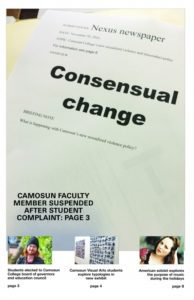The streets swelled and popped with euphoria. Reasons were shared as to why they voted for the winning party: “She just seemed more reassuring”; “My parents voted for them so I did the same”; “I heard too many bad things about the other party”; “Everyone told me I’d be stupid to vote for anyone else.” They won with their eyes shut. They won in their bubble. Blindly they voted, and blindly they won the last provincial election.
What is a victory if you’re not sure what you’re celebrating? Provincial politics aren’t shoved down our throats the way national or international politics are. In the past provincial election, the majority of the people I talked to had blindly voted for their predetermined party favourite.

Being politically informed doesn’t mean you have to take a course in political science or consume every bit of political news that comes your way. It means you should take part in the conversation. Talk to people who have a different point of view and listen to them; don’t try to convince them that their views are wrong. Ignorance is blind dismissal; an informed voter steps out of their sphere of influence and sees what the other side has to say.
BC has seen large changes in the areas of housing, student debt, public transit, drug addiction, and environmental issues, to name a few. If any of these matters are important to you as a student living in BC, then you’d better do your political homework. It’s crucial to encourage friends and family to vote, especially those who don’t live in your electoral district (ED). Why? Areas of BC are separated into EDs; during an election, candidates campaign in the hopes of becoming the member of the legislative assembly (MLA) for their electoral district. As an informed voter, you are aware of the different parties’ campaigns; say you like the cut of one party’s jib, so you vote for their candidate in your district. The candidate with the most votes becomes the MLA for that district. The party with the most MLAs in BC wins the election, and that party’s leader becomes the premiere of BC.
BC had a population of 4.58 million in 2013, when the last provincial election was held; 0.9 of that 4.58 million were in the millennial age group, according to BC Stats. People of ages 34 and younger made up 704,960 of all registered voters, yet less than half of these voters voted in the last provincial election. In total, 57.1 percent of all registered voters actually voted.
People have their reasons for not voting but, seriously, less than 50 percent for those under 34? We can do a lot better than that.
If you are at all concerned with the way things are going here in beautiful British Columbia, show your support by doing the research, spreading the word, and actually voting. Maybe the streets will be different this time. Rather than tying each other’s blindfolds, we will be taking them off. Maybe this time we will know why we are celebrating.
